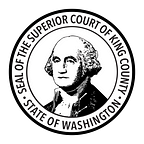King County Proclaims May Treatment Court Month. Here’s What That Means for Participants
The King County Council and the King County Executive proclaimed May Treatment Court Month. This recognizes and celebrates the success of program participants. It also affirms the important role courts play in addressing problems at the intersection of public safety and public health.
For three decades, King County’s treatment courts have helped people whose legal system involvement stems from substance use disorders and/or mental health disorders to transform their lives.
What are treatment courts?
Treatment courts provide treatment for substance use disorders and mental health disorders underlying legal system involvement while ensuring that participants have the resources and support that they need to be successful — including basic needs like housing, food, employment, a driver’s license, or identification.
Treatment courts are rooted in an understanding that the War on Drugs failed, and that not treating substance use and mental health disorders simply perpetuates a vicious cycle of relapse and recidivism. King County Drug Diversion Court (KCDDC), opened in 1994 to provide a therapeutic alternative for individuals whose substance use disorder brought them into the criminal legal system. KCDDC was the 12th treatment court in the United States; today there are more than 3,800 nationwide. KCDDC now takes primarily felony property crimes driven by addiction, providing an off-ramp from the criminal system.
This therapeutic model spread. Today, King County Superior Court’s Family Treatment Court is a “drug court” for families involved in the child welfare system. JTRAC, which stands for Juvenile Therapeutic Recovery and Accountability Court, applies the best practices of therapeutic courts to juvenile matters. For misdemeanor and gross misdemeanor cases, King County District Court operates King County Regional Mental Health Court, King County Veterans’ Court, and community courts in Auburn, Redmond and Shoreline-Kenmore.
Accountability is an integral part of treatment courts; participants are required to engage in treatment, maintain sobriety, and take prescribed medications. The court and case managers monitor progress to help participants stay on track. Those who do not meet program expectations face consequences related to the legal matter that brought them into the program.
Why are treatment courts effective?
Since their start in Miami, Florida in 1989, treatment courts have become one of America’s most researched and effective government programs, and King County’s programs are no exception. Most graduates of King County Drug Diversion Court have been in other recovery programs, but those haven’t worked out for them. Yet in the 36-month follow-up, 81% of Drug Diversion Court participants have no new felonies. (That is all participants, not just graduates.) Children of King County Family Treatment Court parents are 70% more likely to be returned home compared to children in regular dependency. Outcomes for families of color in King County Family Treatment Court are better in each category (treatment access, treatment outcomes, and dependency case outcomes) compared to families of color who went through regular dependency. King County Regional Mental Health Court participants were found to have significantly lower recidivism, lower psychiatric hospitalization rates, fewer days of incarceration, and fewer emergency department visits than a matched comparison group.
It’s hard to say exactly why people succeed in treatment courts when they haven’t been able to achieve recovery in other programs. Every individual’s experience is unique — just like they are. But participants often mention the combination of structure and support that is unique to the therapeutic court approach.
“Everybody was for you — the judge, the prosecutor, everyone,” said Freddie, a 2022 King County Drug Diversion Court graduate. “The whole team claps for you and is excited when you are doing well…I had a team behind me that wanted me to succeed.”
Judge Elizabeth Berns, who has served as both a Family Treatment Court and a King County Drug Diversion Court judge, said she’s learned that participants “perceive the quality of their interactions with the judge to be among the most influential factors for success in the program.”
She works to establish a meaningful connection with each participant, aware that it could help them change their life.
That, in turn, has changed hers.
“I have much more compassion as a result of having a greater understanding and acknowledgement about the battles which individuals are facing in addiction, the pain of being on the street, and the isolation from family and friends,” she said. “My experience has made me a better judge in all types of proceedings because I can appreciate that every person who comes before me has an important life story.”
King County Councilmember Sarah Perry read the Proclamation May 23 in the Council Chambers on the 10th floor of the King County Courthouse in downtown Seattle.
